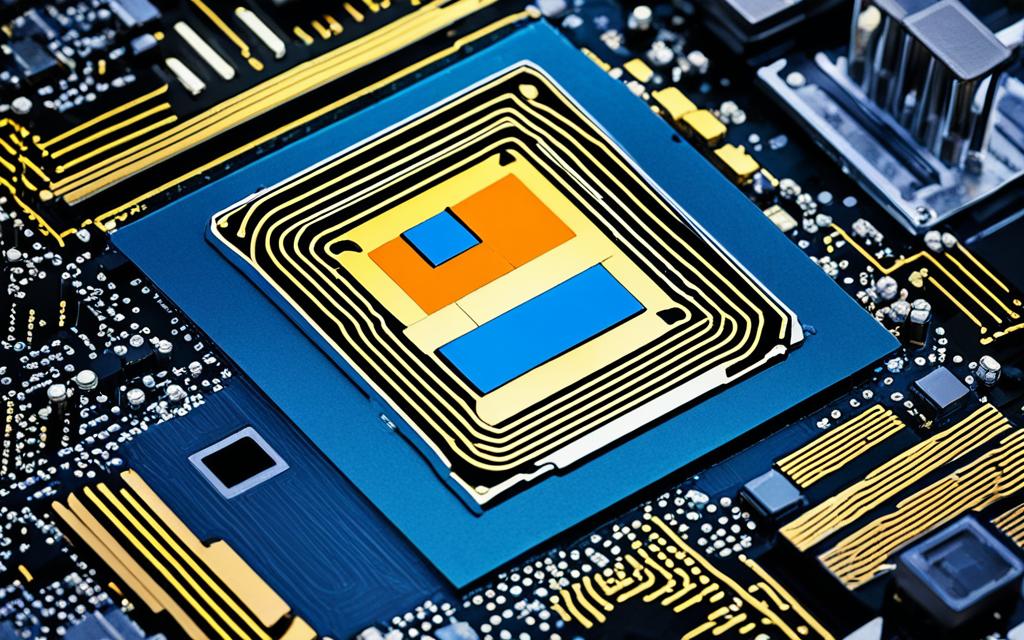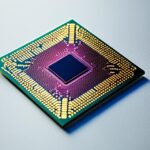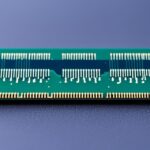Table of Contents
The performance of a CPU is determined by several crucial factors. It’s important for anyone looking to assess or improve their computer’s power to understand these elements. Key performance indicators include clock speed, number of cores, cache size, and the instruction set architecture (ISA).
Clock speed and core count greatly affect a CPU’s ability to handle many tasks at once. Higher clock speeds mean instructions are completed quicker. More cores offer better multitasking12. The cache size boosts speed by providing quick access to often-used data and instructions12. Knowing about these components helps users choose the right CPU for their needs.
Key Takeaways
- CPU processing power is influenced by various factors, including clock speed and core count.
- A higher clock speed leads to faster processing capabilities.
- Multi-core processors enhance multitasking efficiency.
- Larger cache sizes improve access speed to important data.
- Understanding instruction set architecture is crucial for optimal performance.
- Effective cooling solutions are essential to maintain CPU performance.
- Evaluating CPU performance metrics can guide purchasing decisions.
Understanding CPU Processing Power
The CPU’s processing power is crucial for a computer to work well. It’s like the brain of a PC. It has millions of transistors and manages all computing and processing3. A good CPU makes sure the computer can do tasks smoothly. This includes everything from simple maths to complex graphics.
Back in the 1980s, processors worked at a speed of 3 to 5 megahertz. This means they could handle three to five million pulses every second4. Now, modern CPUs work much faster, from 3 GHz to 5 GHz. That’s three to five billion pulses per second4. This huge leap shows how fast technology is moving forward.
Cache memory size also matters a lot for CPU power. It’s a type of fast RAM inside the processor. A bigger cache means the CPU works faster because it takes less time to get instructions5. Also, many modern CPUs have more than one core. This lets them do several tasks at once, improving performance a lot4.
Understanding CPU power is about knowing how design affects function. Technology keeps getting better. New processors are faster, better at multitasking, and use their cache more effectively. This highlights why the CPU is so vital for computers today.
Clock Speed: The Heart of CPU Performance
Clock speed is key to understanding how fast a CPU works. It tells us how many tasks a CPU can do in one second. High clock speed means a computer can do things quickly and smoothly. It’s especially important for gamers and graphic designers who need speed6. Choosing the right CPU means looking at its clock speed.
What is Clock Speed?
A CPU’s clock speed shows how fast it can handle tasks, with higher speeds meaning better performance7. For example, a 3.0 GHz CPU can do 3 billion things in a second. Knowing about clock speed helps you pick the best computer for your needs.
Impact of Higher Clock Speed on Performance
Higher clock speeds boost how well a CPU works. They let CPUs deal with information faster and make multitasking easier6. However, extra speed can make a CPU hot. So, it’s important to keep it cool to avoid damage7.
| Clock Speed (GHz) | Instructions per Second | Performance Impact |
|---|---|---|
| 2.0 | 2 Billion | Standard Multitasking |
| 3.0 | 3 Billion | Enhanced Performance |
| 4.0 | 4 Billion | High-Performance Computing |
Number of Cores: Multitasking Efficiency
In today’s digital world, the number of CPU cores is key for good multitasking. A CPU core is like a worker in the computer’s brain. It can do different tasks at the same time. Thanks to this, computers can now do many jobs at once quickly and well.
What is a CPU Core?
A CPU core is a part inside a computer’s brain that does calculations. Now, most computers have at least two cores. This change has made computers much faster at doing many things at once in computing 8.
Benefits of Multi-Core Processors
Having more than one CPU core is great for doing many things at the same time. For example, editing videos or analysing data gets much easier. Usually, computers have between four and eight cores. This lets the computer work on different tasks at the same time without slowing down.
Even though more cores usually mean a computer can do more at once, there are downsides. These include using more electricity and getting hotter. When choosing a computer, think about how many cores it has and how fast they are. This balance will help you pick the best one for both simple and tough jobs9. Balancing the number of cores against the need for higher clock speeds often provides the best results for both everyday tasks and more intensive computing workloads.
Cache Size: The Fast Memory Advantage
Cache memory is a crucial part of a CPU’s design. It gives quick access to data and instructions used often. This speedy memory serves as a link between the CPU and the main memory. It speeds up data fetching and boosts processing efficiency. Knowing about the different cache levels, like L1, L2, and L3, helps one understand their big impact on speed and performance.
What is Cache?
Cache is a tiny, speedy storage space inside the CPU. It holds data that we need over and over again. It’s way faster than RAM, answering the CPU’s calls in just nanoseconds10. The cache is set up in levels, with L1 being on the chip and the quickest11.
This set-up helps the CPU handle tasks better by cutting down on wait times and managing data smoothly. This leads to quicker processing.
How Larger Cache Size Affects Processing Speed
Having a bigger cache improves computing a lot. It stores more data that’s used often, making data fetching more efficient. This cuts down the time needed to get data from the slower main memory12. Also, cache memory speeds up processing by reducing delays in accessing data. This ensures the CPU works well, handling tasks faster and boosting the work flow.
Grasping the details of cache memory is vital for better CPU use. As technology moves forward, it’s important to check factors like cache hit ratios. These checks are key in boosting fast processing abilities11.
Instruction Set Architecture and Its Role
The Instruction Set Architecture (ISA) is key in computer processing. It outlines the main instructions a CPU can carry out. This architecture boosts the CPU’s task performance and keeps applications working well on different hardware.
Understanding Instruction Mat Architecture (ISA)
ISA covers many elements like instructions, data types, and how memory is handled. About 70% of software is made with a certain ISA13 in mind. This makes sure software can vary in performance, size, and cost without needing to replace the software14. The idea of binary compatibility lets different processors run the same machine code. This makes ISAs vital for modern computing14.
Complex Instructions and CPU Performance
Complex instructions are crucial for better CPU performance. They handle many tasks in one go, like transferring data or doing maths. This makes the CPU work more efficiently14. RISC systems, which use simpler instructions, are often faster by about 30% compared to CISC systems13. The ability to add to the ISA means a performance boost of about 25% for specific tasks13. With careful design, ISAs can improve data handling speeds by up to 45% for demanding tasks13.
| Architecture Type | Characteristics | Performance Advantages |
|---|---|---|
| CISC | Complex instruction set | Can execute multi-step operations in a single instruction |
| RISC | Simpler instruction set | Up to 30% improvement in execution speed comparedd to CISC |
| MIPS | Widely used in education, simple structure | Enhances understanding of fundamental computing concepts |
Thermals and Cooling Solutions for Optimal Performance
Keeping your computer’s thermals in check is crucial for top CPU performance. Good cooling systems keep processors at safe temperatures. This helps them work better and last longer. Without the right cooling, CPUs can overheat. This causes them to slow down, affecting performance.
Importance of Cooling Systems
Cooling systems, like fans and liquid coolers, stop overheating. They allow CPUs to maintain high performance without overheating risks. Overheating can make processors use more energy and damage them over time. So, reliable cooling is key in computing environments16.
How Heat Affects CPU Performance
Too much heat can harm electronic parts and shorten their life. Cooling is crucial to keep hardware in good shape. There are many ways to cool, including fans, liquid systems, and advanced cooling like phase change16. Having good airflow is important for better performance and is essential when you push processors harder17.
Finding a balance between better performance and cooling is key. The challenge includes dealing with space, noise, and upkeep. That’s why serious gamers, creators, and professionals need proper cooling solutions17.
| Cooling Method | Benefits | Challenges |
|---|---|---|
| Air Cooling | Cost-effective, easy installation | Less efficient for overclocking |
| Liquid Cooling | Efficient heat dissipation, quieter | Higher cost, potential for leaks |
| Phase Change Cooling | Extremely effective for extreme overclocking | Complex installation, high maintenance costs |
What Factors Determine the Processing Power of a CPU
The performance of a CPU comes down to several important factors. First off, its core architecture matters a lot. Nowadays, CPUs usually have multiple cores to handle many tasks at once. For gaming, dual-core or quad-core processors are common18. They boost the computer’s ability to play games smoothly. Meanwhile, desktop CPUs often run faster because they are in bigger cases. These cases allow better cooling18, keeping the CPU’s performance stable when it’s working hard.
Cache size also plays a key role in how fast a CPU can work. Modern CPUs use smart caching to work more efficiently, reducing waiting time. For tasks like video editing or using demanding software, CPUs that are faster and have more cores work best18. Over time, we see CPUs improving, thanks to better use of silicon chips19. This advance allows more transistors to fit on a chip, boosting processing power.
Finally, CPU strength is often talked about in terms of flops. This means how many calculations it can do in a second20. Today’s desktop CPUs can carry out billions of these operations. Knowing how these elements work together helps in understanding how to upgrade CPU performance. It’s key for getting the best results from your computer.
Conclusion
It’s essential to know what makes a CPU powerful when choosing a computer. Things like clock speed, core count, and cache size all play a part. They help you find a CPU that meets your needs. This ensures your computer runs fast and efficiently. The growth of CPUs, from the Intel 4004 in 1971 to the Core i9 in 2017, shows big improvements in technology. These advancements boost a computer’s abilities21.
Picking the right CPU is key for smooth computing. High CPU usage can come from many places, like background tasks or heavy apps. Sometimes, idle processes use up to 99% of the CPU’s power. This makes it vital to understand and manage CPU performance22. Knowing how to check and fix CPU usage can help avoid lag and other problems.
This summary shows how important it is to know about CPU power. Being informed helps you make good decisions for buying tech and everyday computer use. Choosing the right CPU can make your computer run better and give you a great experience.
FAQ
What factors affect CPU processing power?
Several things impact CPU power. These include the clock speed, core count, cache size, and the type of ISA. Knowing about these helps us understand how well a computer or device will work.
How is CPU performance measured?
CPU speed is measured in gigahertz (GHz), and performance looks at core and cache size. These details show how good a CPU is at doing tasks, like running games or office programs.
What role does clock speed play in CPU performance?
Clock speed shows how fast the CPU works, in GHz. A faster clock speed means better performance. But, it can make the CPU hot, so good cooling is necessary.
What is the significance of having multiple CPU cores?
Having more cores boosts how well a CPU can do several things at once. This is great for programs made for multi-core processing. It really speeds things up.
How does cache size impact CPU performance?
A bigger cache lets the CPU get to needed data faster. This cuts down on the wait time for getting data from the main memory. It makes your computer run smoother and quicker.
What is instruction set architecture (ISA) and why is it important?
ISA sets the CPU’s basic commands. Its design matters for running apps smoothly and for the CPU’s efficiency in handling complex instructions.
Why are cooling systems important for CPU performance?
Cooling keeps the CPU at a safe temperature to avoid slowing down, known as thermal throttling. Good cooling also helps your CPU last longer and work better.
How can I enhance my CPU’s processing power?
To boost your CPU’s power, improve the clock speed and core count. Also, use a larger cache and a good ISA. Keep your CPU cool for the best performance.
Source Links
- https://www.makeuseof.com/things-that-affect-cpu-processor-performance/ – The 9 Things That Affect CPU Performance
- https://www.vaia.com/en-us/explanations/computer-science/computer-organisation-and-architecture/cpu-performance/ – CPU Performance: Improvement & Influencing Factors
- https://www.geeksforgeeks.org/role-of-processor-in-a-pc/ – Role of processor in a PC – GeeksforGeeks
- https://www.bbc.co.uk/bitesize/guides/zbfny4j/revision/6 – Factors affecting CPU performance – Systems architecture – OCR – GCSE Computer Science Revision – OCR – BBC Bitesize
- https://cards.algoreducation.com/en/content/f1Typ9ga/cpu-performance-factors – CPU Performance and Factors Affecting It
- https://www.clxgaming.com/blog/pc-parts-benchmark/understanding-cpu-specs – Understanding CPU Specs: How They Determine PC Performance | CLX Gaming
- https://pcinternational.co.za/cpus-role-in-a-computer/ – Understanding the CPUs Role in a Computer Functionality
- https://www.auslogics.com/en/articles/does-more-cpu-cores-mean-better-performance/ – CPU Cores Explained: Does the Number of Cores Affect CPU Performance?
- https://gadgetmates.com/exploring-the-relationship-between-cpu-clock-speed-and-cores – Unlocking the Secrets of CPU Performance: Cores vs. Clock Speed – GadgetMates
- https://www.techtarget.com/searchstorage/definition/cache-memory – What is Cache Memory? Cache Memory in Computers, Explained
- https://www.geeksforgeeks.org/cache-memory-in-computer-organization/ – Cache Memory in Computer Organization – GeeksforGeeks
- https://www.studyforfe.com/blog/cache-memory-in-computer-systems/ – Cache Memory in Computer Systems, Techniques & Formulas
- https://www.lenovo.com/us/en/glossary/instruction-set-architecture/ – The Basics of Instruction Set Architecture
- https://en.wikipedia.org/wiki/Instruction_set_architecture – Instruction set architecture
- https://www.geeksforgeeks.org/microarchitecture-and-instruction-set-architecture/ – Microarchitecture and Instruction Set Architecture – GeeksforGeeks
- https://www.linkedin.com/advice/0/how-does-cooling-impact-processor-performance-xj17e – How does cooling impact processor performance?
- https://medium.com/@starcompseo/maximizing-performance-how-cooling-systems-enhance-your-pcs-speed-b14911445b27 – Maximizing Performance: How Cooling Systems Enhance Your PC’s Speed
- https://www.hp.com/us-en/shop/tech-takes/what-is-processor-speed – What is Processor Speed and Why Does It Matter? | HP® Tech Takes
- https://en.wikipedia.org/wiki/Central_processing_unit – Central processing unit
- https://computer.howstuffworks.com/computing-power.htm – What is computing power?
- https://www.geeksforgeeks.org/central-processing-unit-cpu/ – Central Processing Unit (CPU) – GeeksforGeeks
- https://www.site24x7.com/learn/linux/cpu-utilization.html – Understanding CPU utilization in Linux: Site24x7












